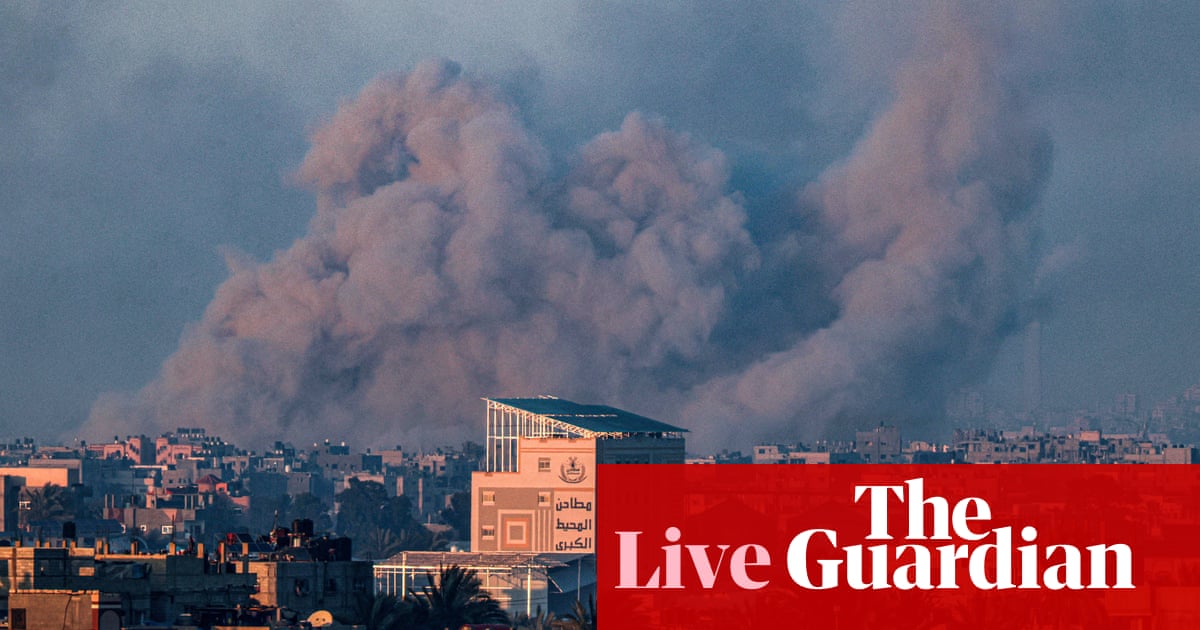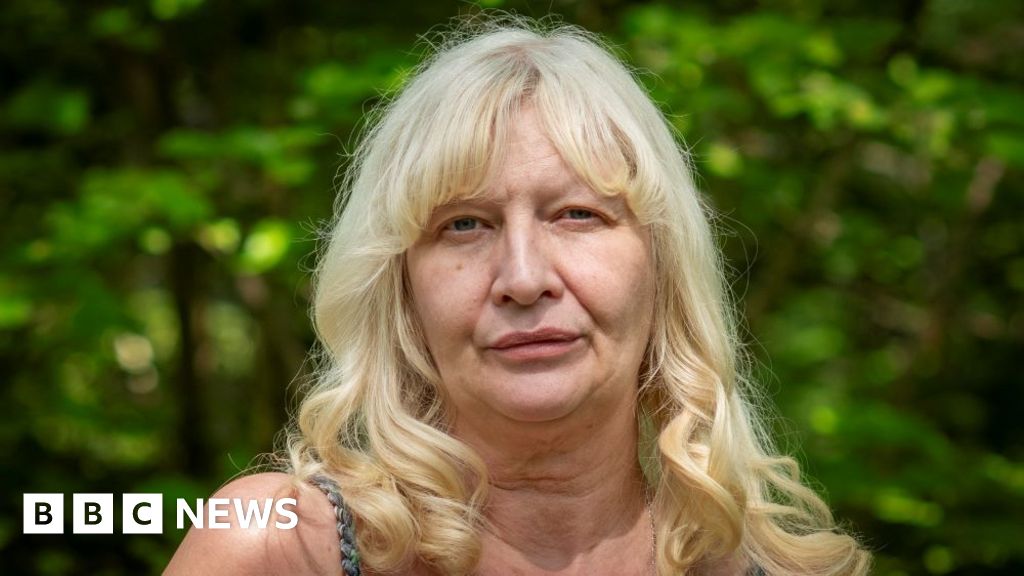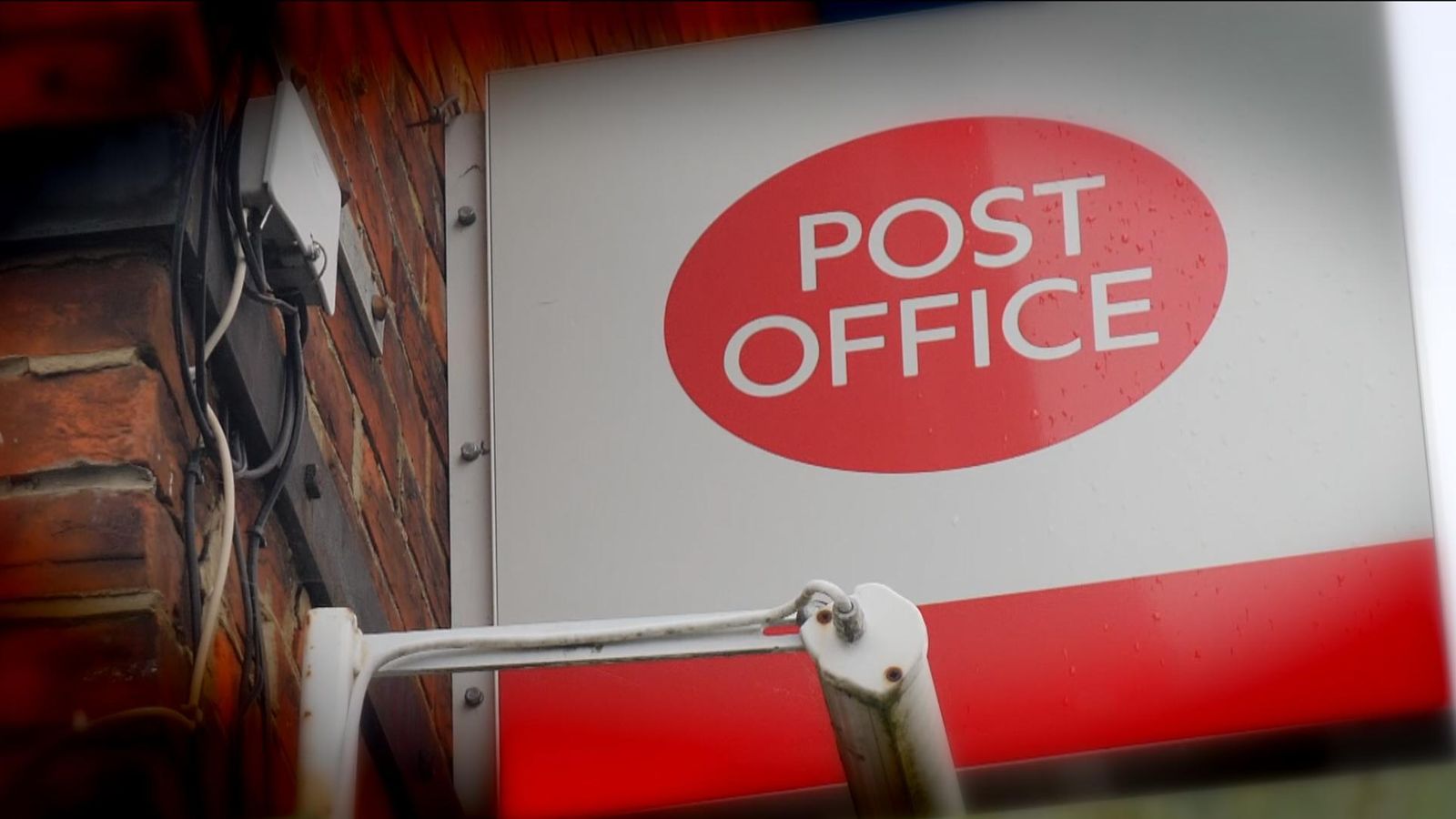Key events
The UK’s housing secretary, Michael Gove, has echoed foreign secretary David Cameron’s concern about Israel’s expected invasion of the Gazan city of Rafah (see post at 08.34 for more details).
He told the BBC’s Laura Kuenssberg on Sunday programme:
We need to make sure that the people who were taken hostage by Hamas are returned to their families.
The events on October 7 were the worst loss of innocent Jewish life since the Holocaust. It was an horrific pogrom and my heart grieves for Israel and what it’s had to endure.
At the same time, while it is absolutely right to deal with that terrorist threat, we know – and again, it’s very difficult – we know that the Gazan Palestinian population has been suffering.
What we want to see, as the foreign secretary, the prime minister have made clear, is a sustainable ceasefire and that means an opportunity both to ensure that there’s an end to Hamas terrorism, but also that the aid and support that the Palestinian people need and deserve can be delivered.
PRCS: Israeli forces preventing oxygen reaching al-Amal hospital and are blocking fuel delivery
The Palestinian Red Crescent Society (PRCS) said Israeli forces have prevented oxygen from reaching the al-Amal hospital for over a week, resulting in the deaths of three patients.
The PRCS said Israel has also not provided medical equipment, and continues to block the delivery of fuel for the hospital’s electricity generators, despite the fuel supply running out in two days, risking a shutdown.
In a post on X, the PRCS wrote:
The Israeli occupation forces claim to have delivered oxygen cylinders to al-Amal hospital, but in reality, they have prevented oxygen from reaching the hospital for over a week, resulting in the deaths of three patients, despite continuous coordination efforts with international organisations.
Two days ago, after significant pressure, we obtained approval to bring oxygen to the hospital. The Palestine Red Crescent ambulance transported 25 oxygen cylinders from Nasser Hospital.
However, the occupation authorities demanded that the cylinders be placed closest to the hospital, promising to deliver them. The following day, only 21 oxygen cylinders were placed in front of the hospital building by the occupation forces.
The Israeli occupation forces claim to have delivered oxygen cylinders to Al-Amal Hospital, but in reality, they have prevented oxygen from reaching the hospital for over a week, resulting in the deaths of three patients, despite continuous coordination efforts with international… pic.twitter.com/EIa8CISwPs
— PRCS (@PalestineRCS) February 11, 2024
Death toll in Gaza reaches 28,176, says health ministry
A total of 28,176 Palestinian people have been killed and 67,784 have been injured in Israeli strikes on Gaza since 7 October, the Gaza health ministry said in a statement on Sunday.
An estimated 112 Palestinians were killed and 173 injured in the past 24 hours, the ministry added.
Most of the casualties have been women and children, the ministry has said, and thousands more bodies are likely to remain uncounted under rubble across Gaza.
Al Jazeera reports on the detentions carried out by Israeli troops across the occupied West Bank in the morning.
The Palestinian Wafa news agency says the Israeli forces arrested three young men at the northern entrance of the city of Jericho.
The arrests were made as they passed through a military checkpoint at the northern entrance to the city.
Earlier, arrests across the occupied West Bank were reported by the agency, including in the cities of Hebron, Yatta, al-Bireh and Bethlehem.
The managing director of the International Monetary Fund (IMF), Kristalina Georgieva, said she was confident about the economic outlook despite uncertainties around war and geopolitics as the global economy has remained resilient.
In a speech at the World Governments Summit in Dubai, Georgieva said the IMF would publish a paper on Monday that shows phasing out explicit energy subsidies could save $336bn in the Middle East, equivalent to the economies of Iraq and Libya combined.
In its latest regional economic update published last month, the IMF revised its GDP growth forecast for the Middle East and North Africa region downwards to 2.9% this year, due in part to short term oil production cuts.
“While uncertainties are still high, we can be a bit more confident about the economic outlook, because the global economy has been surprisingly resilient,” she was quoted by Reuters as saying in the speech.
Speaking about Israel’s war in Gaza, Georgieva warned of widening consequences.
“This exceptionally uncertain moment compounds the challenges of economies that are still recovering from previous shocks. And further widening of the conflict would aggravate the economic harm,” she added.
Netanyahu promises ‘safe passage’ to Palestinian civilians ahead of Rafah offensive
The threat of an Israeli incursion into Gaza’s southernmost town of Rafah persisted on Sunday, with Israel’s prime minister, Benjamin Netanyahu, promising “safe passage” to civilians displaced there, according to Agence France-Presse (AFP).
Despite criticism, Netanyahu reiterated his intention to extend Israel’s military operation to the city. In an interview airing Sunday on ABC News, Netanyahu said: “We’re going to do it”.
He said he agreed “with the Americans” that the offensive would need to first plan for the impact on civilians.
“We’re going to do it while providing safe passage for the civilian population so they can leave,” he said, according to published extracts of the interview and reported by AFP.
But it is unclear where such a large number of people, who are pressed up against the border with Egypt and sheltering in makeshift tents, can go.
Israel has carried out airstrikes in Rafah almost daily, even after telling civilians in recent weeks to seek shelter there from fierce ground combat in Khan Younis, just to the north.
The head of the UN agency for Palestinian refugees (UNRWA), Philippe Lazzarini, said on Friday that a major Israeli offensive in Rafah “can only lead to an additional layer of endless tragedy”.
Netanyahu’s office has said four Hamas battalions were in Rafah and Israel could not achieve its stated goal of eliminating the militant group while they remained there.
The UK’s foreign secretary, David Cameron, and Dutch foreign minister Hanke Bruins Slot have joined the chorus of international concern about the promised assault on Rafah.
“Deeply concerned about the prospect of a military offensive in Rafah – over half of Gaza’s population are sheltering in the area,” Cameron said on X, formerly known as Twitter.
“Hard to see how large-scale military operations in such a densely populated area would not lead to many civilian casualties and a bigger humanitarian catastrophe. This is unjustifiable,” Bruins Slot said.
Deeply concerned about the prospect of a military offensive in Rafah – over half of Gaza’s population are sheltering in the area.
The priority must be an immediate pause in the fighting to get aid in and hostages out, then progress towards a sustainable, permanent ceasefire.
— David Cameron (@David_Cameron) February 10, 2024
Opening summary
We are restarting our live coverage of the Israel-Gaza war and wider Middle East crisis.
Israel’s prime minister, Benjamin Netanyahu, has reiterated his intention to extend Israel’s military offensive to Gaza’s southernmost city of Rafah, despite international condemnation with more than half of the Gaza Strip’s 2.4 million people crammed into the area.
In an interview airing on Sunday, Netanyahu promised “safe passage” to civilians displaced there.
More on that story shortly. Here is an overview of some of the other latest key developments:
-
Airstrikes on the Gaza Strip’s southernmost town of Rafah have killed at least 28 people. Each strike killed multiple members of three families, including 10 children, the youngest just three months old, the Associated Press reported.
-
Hamas on Saturday warned that there could be “tens of thousands” of dead and injured if the Israeli military attacked Rafah. In a statement, Hamas said that any military action would have catastrophic repercussion. AFP said witnesses reported new strikes on Rafah early on Saturday, raising fears among Palestinians of a looming ground invasion.
-
Israel’s plans for a military offensive on Rafah in the Gaza Strip are “alarming”, the EU’s foreign policy chief, Josep Borell, said.
-
Egyptian foreign minister Sameh Shoukry said any Israeli ground offensive on Rafah would have “disastrous consequences,” and asserted that Israel aims to eventually force the Palestinians out of their land. Another mediator, Qatar, also warned of disaster, while Saudi Arabia spoke of “very serious repercussions”.
-
German foreign minister Annalena Baerbock said on X that an Israeli offensive on Rafah would be a “humanitarian catastrophe in the making”. She said, “The people in Gaza cannot disappear into thin air”.
-
An Egyptian official told the Guardian that under no circumstances would fleeing Palestinians be allowed to cross the border into the Sinai peninsula, and any attempt to relocate them to Egyptian soil would collapse the peace deal between Egypt and Israel. The population of Rafah has swelled to more than 1.5 million people – roughly three-quarters of Gaza’s population – as people flee fighting elsewhere in Gaza.
-
Israel appears to be in breach of the orders issued a fortnight ago by the international court of justice requiring it to take immediate steps to protect Palestinians’ rights and cease all activities that could constitute genocide, the UN special rapporteur on the occupied territories, Francesca Albanese, has said.
-
A food shipment for 1.1 million Palestinians is stuck at an Israeli port due to recent restrictions from Israeli authorities, says the UN agency for Palestinian refugees (UNRWA) as an estimated 25% of families in Gaza face catastrophic hunger. The agency said that the Israeli contractor they work with received a call from Israeli customs authorities “ordering them not to process any UNRWA goods”.
-
A senior Hamas official survived an assassination attempt in Lebanon by an alleged Israeli strike, a Palestinian security source told AFP. Another source told Reuters that the person targeted was close to Saleh al-Arouri, the Hamas deputy chief killed last month in a suspected Israeli strike on a suburb of Beirut. Sources said a Hezbollah member and two civilians were killed by the strike in the coastal town of Jadra, about 40 kilometres (25 miles) from the Lebanese border.
-
The Gaza health ministry on Saturday said that at least 117 people were killed in overnight bombardment, including more than 20 in strikes in Rafah. It also said 152 were injured in Israeli strikes in the past 24 hours.
-
A six-year-old Palestinian girl who went missing after the family’s car came under fire in Gaza has been found dead, the Hamas-run health ministry and her relatives said, accusing Israel of killing her. The last time Hind Rajab had been seen was about two weeks ago when she was surrounded by dead relatives after becoming trapped in the vehicle as they tried to flee Gaza City as Israeli forces advanced. The PPRCS had frequently posted updates on its X account pleading for updates and information on Rajab.
-
The Palestinian Red Crescent Society (PRCS) said that three children were killed in a strike in Rafah. The PCRS also said that Israeli forces raided al-Amal hospital in Khan Younis, southern Gaza’s biggest city, on Friday after a weeks-long siege during which the PRCS reported “intense artillery shelling and heavy gunfire”.
-
The PRCS accused Israeli forces of the ‘deliberate targeting’ of a PRCS ambulance that resulted in the death of two of its medics, Yusuf Al-Zeino and Ahmed Al-Madhoun.
-
The Iranian foreign minister Hossein Amir-Abdollahian said neither Iran nor Lebanon had sought to expand hostilities in the region. “Iran and Lebanon confirm that war is not the solution, and that we absolutely never sought to expand it,” he told a press conference alongside his Lebanese counterpart in Beirut on Saturday.
-
“Israel’s declared ground offensive on Rafah would be catastrophic and must not proceed,” Doctors Without Borders said in a statement. “There is no place that is safe in Gaza and no way for people to leave.”
-
Israel’s army has deployed artificial intelligence-enabled military technology in combat for the first time in Gaza, raising fears about the use of autonomous weapons in modern warfare.
-
Hezbollah said on Saturday it had seized an Israeli Skylark drone over Lebanese airspace “in good condition”. The Skylark is a small, unmanned aerial vehicle typically used for surveillance and produced by Israel-based weapons manufacturer Elbit Systems.
-
The Saudi foreign ministry cautioned against the “extremely dangerous repercussions” of Israel “storming and targeting” the city of Rafah. It said “this continued violation of international law and international humanitarian law” confirmed the necessity of convening the UN security council urgently “to prevent Israel from causing an imminent humanitarian catastrophe”.
-
Israeli occupation forces continued their siege of the Nasser medical complex in Khan Younis for the 20th day and reached its northern gate, reports Al Jazeera. “The occupation forces have been besieging us for 20 days and we are suffering from a shortage of food and drink,” Nahidh Abu Tamiyya, the head of the surgical department told an Al Jazeera correspondent.
-
Two Palestinians have been killed by an Israeli sniper – one in front of the Nasser medical complex reception gate, and the other in the emergency department, according to Wafa news agency. It said that medical teams cannot move between the complex’s buildings due to the snipers, and that the lives of 300 health personnel, 450 patients and injured, and 10,000 displaced people inside the Nasser medical complex are threatened.
-
The head of the UN agency for Palestinian refugees (UNRWA) Philippe Lazzarinisaid he followed “reverse due process” in sacking nine staff members accused by Israel of being involved in Hamas’s 7 October attacks. Lazzarini said he did not probe Israel’s claims against the employees before dismissing them and launching an investigation.
-
Three people were killed in on Israeli airstrikes that targeted a building in an upmarket area near Damascus on early Saturday, the Syrian Observatory for Human Rights said.
-
Iran’s football federation said on Saturday it had asked world football’s governing body, Fifa, to suspend Israel’s football federation over the country’s war in Gaza.

Emily Foster is a globe-trotting journalist based in the UK. Her articles offer readers a global perspective on international events, exploring complex geopolitical issues and providing a nuanced view of the world’s most pressing challenges.








